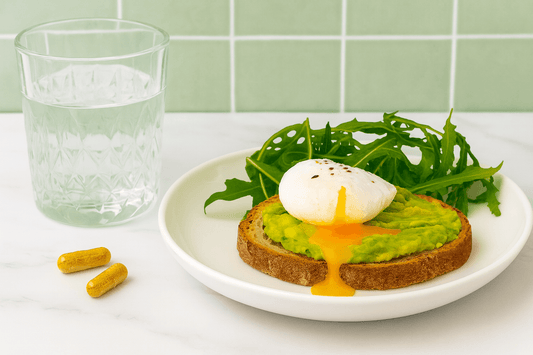
Maybe you shouldn't take calcium supplements
Bone health’s something we often aren’t aware of until there’s a problem! In the case of osteoporosis, you don’t feel any symptoms for years while bone density declines and it’s often diagnosed after a fracture.
Everyone should be aware of the nutrients needed to maintain bone density, but it’s especially important for women; as oestrogen declines with age, so bone loss increases.
Basics for maintaining bone density
- Keep Vitamin D levels up. 1 in 3 people in the UK are deficient! Everyone in the UK needs to supplement Vitamin D3.
- Supplement Vitamin K2. This is overlooked by mainstream medical advice but as our diets lack fermented foods, we should supplement this too. You can get a good dose of both D3 and K2 in your Pollution Protection Multivitamin.
- Maintain strength and balance.
- Increase magnesium rich foods like green leafy vegetables, and take a well-absorbed magnesium supplement.
Do you need to supplement calcium?
The National Diet and Nutrition Survey showed that our dietary calcium intake is pretty good (UK adults’ mean calcium intakes are above the recommended nutrient intake).
Whereas:
- Magnesium intake is more commonly low
- Vitamin D deficiency is a major issue
- Vitamin K2 is overlooked altogether, being lumped in with K1 and not having its own dietary reference value.
Yet these 3 are vital for getting dietary or supplementary calcium INTO bones, so it’s pointless taking calcium supplements alone.
If you have a good dietary intake of calcium, the priority for supplementation should be Magnesium, D3 and K2.
And if you do need to take calcium supplements - whether prescription or not - it’s vital you take these others too.
Failure to do so could mean all that calcium you're taking gets deposited inappropriately elsewhere in the body - for example your arteries!
Summary on calcium and bone density
While calcium is essential for strong bones and a key supplement for sufferers of osteoporosis, there’s no point supplementing it if you won’t absorb it well!
- Take our Multivitamin which includes your D3 and K2.
- If possible, check your Vitamin D status, in case you need to take a higher dose - either via your GP or a home test.
- Add Magnesium at a different time of day for better absorption
- Remember that to absorb nutrients from food and supplements we need to cultivate good digestive health and avoid taking antacids.
- Consider adding collagen to your diet - it has amazing potential to promote cartilage and bone regeneration.
Hope this will be helpful - no doubt you know many women taking calcium supplements, so please share this essential info on nutrient cofactors!



